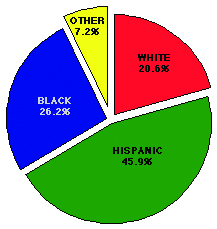by the El Reportero’s wire services
The Latino population has become the largest ethnic group in California with 15 million people, the United States Census Bureau has confirmed today.
According to census figures, California´s Latinos outnumber the 14.99 million non-Hispanic whites living in the state.
It is the first time this happens in California, where the Anglo population started to decline in the 1970s.
The surge of the Latino population in the state coincides with an increase off this minority population in the country, reaching the 55.4 million people, according to recent figures.
Other regions with a large number of Latinos are Texas (10.41 million), Florida (4.78 million), New York (3.67 million) and New Mexico, where Latinos represent more than 47 percent of the state´s population.
Figures suggest that the community will continue to grow in other US territories, even in those with less presence like Kentucky, Idaho, Montana, North Dakota and New Hampshire.
OAS mission visits the Dominican Republic and Haiti
A mission of the Organization of American States (OAS) today began to assess the situation of Haitian immigrants in the Dominican Republic, to tackle afterwards the same subject in Port au Prince.
The group is headed by the Secretary for Political Affairs of the OAS, Francisco Guerrero, who is accompanied by Gabriel Bidegain, advisor to the secretary general, Luis Almagro, and officials from the the Caribbean Community and the United Nations could join.
The objective is to know on the field the status of Haitians immigrants to facilitate a lasting solution to regularize their status and rights, said Almagro.
The mission is the result of two special sessions of the Permanent Council of the OAS that has addressed the existing crisis between Haiti and Dominican Republic, Almagro said.
First, the Dominican Foreign Minister, Andrés Navarro defended his government’s plan to bring order to the illegal immigration in the country.
He also referred to the Special Naturalization Act (169-14), which recognizes the status of Dominicans to those born from illegal immigrants and has benefited 8,755 people.
The Dominican plan, which ended on June 17 after 18 months of execution, was to provide an opportunity for illegal immigrants to legalize their status.
Because of it, 288,466 foreigners have begun to receive documents that legalize their stay in the country, but many Haitian immigrants were eligible for this plan. The Haitian ambassador in Dominican Republic, Daniel Supplice, acknowledged to the newspaper Le Nouvelliste: “We are responsible for what happens to our countrymen today.”
The Haitian government did not provide the required documents (passports, identity cards or birth certificates) so that these people could start their migration regularization.
As a result of this situation, during the last weeks over 20,000 Haitians voluntarily returned to their country with their belongings because they feared to be repatriated.
The Haitian government reacted by denouncing alleged mass deportations and argued that they are violating the rights of their countrymen and their children born on Dominican soil.
For the Dominican ambassador to the OAS, Pedro Verges, the Haitian government has generated a disinformation campaign with the sole purpose of hiding its abandonment towards their countrymen who emigrate.



